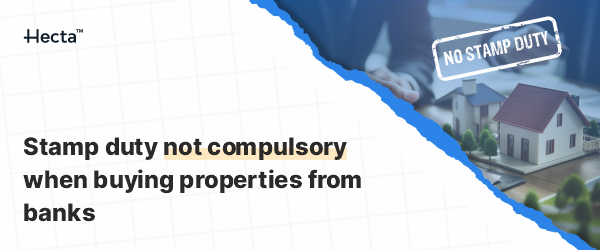
Stamp duty is Not Compulsory when buying properties from banks under SARFAESI Act, 2002
Attributed to Mr. Sridhar Samudrala, Founder & CEO, Hecta
Discover how buying properties from banks under the the Securitisation and Reconstruction of Financial Assets and Enforcement of Security Interest (SARFAESI) Act can save you significantly—no stamp duty, typically 5% to 10% of the registration value, required. This exemption not only makes these properties more affordable but also opens doors for investors looking to capitalize on lucrative opportunities in buying, flipping, or trading real estate. With INR 5,71,850 Crores of NPAs reported by the Reserve Bank of India at FY23’s end across 89 scheduled banks, the market is ripe for savvy buyers.
Awareness of buying properties from banks under the SARFAESI Act is essential to capitalize on these opportunities. In a significant ruling, the Supreme Court of India has clarified the law and has laid down that buyer of properties under the SARFAESI Act, 2002 are not required to pay any stamp duty. This ruling, which dismissed a Special Leave Petition (SLP) against a Madras High Court judgment, highlights the streamlined and cost-effective processes available to buyers of distressed assets. The relevant para 16 of the judgment of the Hon’ble Supreme Court in “Esjaypee Impex Private Limited Vs. Assistant General Manager and Authorised officer, Canara Bank”, (2021) 11 SCC 537 reads as under:
“We are of the view that the mandate of law in terms of Section 17 (2) (xii) read with Section 89 (4) of the Registration Act, 1908 only required the authorized officer of the Bank under the SARFAESI Act to hand over the duly validated sale certificate to the auction purchaser with a copy forwarded to the registering authorities to be filed in Book I as per Section 89 of the Registration Act.”
Notably, one can search for such properties under SARFAESI on platforms like Hecta – a marketplace for bank financed properties across 100+ banks and FIs.
Streamlined Process and Legal Certainty
The central issue in this case was whether a registering authority could demand stamp duty for filing a sale certificate. In November 2022, the Supreme Court decisively ruled against such demands, citing established law. This decision removes unnecessary bureaucratic obstacles and upholds legal protections for buyers. Before this ruling, conflicting views among various High Courts created uncertainty, with revenue authorities insisting on stamp duty from auction purchasers, adding to their costs.
The SARFAESI Act, designed for banks and financial institutions to auction properties of defaulting borrowers, provides a strong legal framework for acquiring distressed assets. This recent judgment clarifies and simplifies the registration process.
Historically, judgments from courts like the Allahabad and Madras High Courts have supported that sale certificates under SARFAESI do not require stamp duty when filed with registering authorities. The Supreme Court’s ruling on 11 November 2022 emphasized that a sale certificate is not equivalent to a conveyance deed requiring stamp duty.
Cases such as Adit Ram v. Masarat-un-Nissa and Essjaypee Impex Pvt. Ltd. v. Asst. General Manager, Canara Bank, established that sale certificates issued under SARFAESI Act do not attract stamp duty. These rulings reassure buyers of distressed properties that they won’t face additional financial obligations when acquiring properties through public auction under the SARFAESI Act, 2002.
In a recent case, “Subhash Chand & Ors, Vs. State of H.P. & Ors,” the Himachal Pradesh High Court directed revenue authorities to proceed with property mutation based on the sale certificate from the bank’s authorized officer, affirming that state authorities cannot block such actions.
These rulings collectively reinforce legal provisions under the SARFAESI Act, safeguarding buyers from extra costs and procedural complexities, fostering an efficient and investor-friendly environment.
Financial Benefits for Buyers
For investors and buyers, this judgment translates into significant cost savings. The non-mandatory payment of stamp duty on the sale certificate means that the overall acquisition cost of distressed properties is lower, making such investments more attractive. Additionally, the streamlined registration process reduces administrative delays, enabling quicker acquisition and transfer of property rights.
The Hon’ble Supreme Court’s direction that the necessary compliance be done within 15 days, further underscores the Judicial system’s commitment to efficiency. By preventing unnecessary litigation and ensuring prompt adherence to judgments, the court has provided a clear pathway for buyers to secure their investments without protracted legal battles.
Encouragement For Investors
The present legal position as mentioned above is a positive signal for investors looking to purchase distressed assets. It reinforces the reliability and stability of the legal framework governing such transactions under the SARFAESI Act. The judgment also serves as a deterrent against frivolous legal challenges, thereby enhancing investor confidence.
Mr. Aditya Kumar Choudhary, practicing Supreme Court Advocate who has handled many SARFAESI matters across DRTs, High Court and Supreme Court says “The Supreme Court’s dismissal of the SLP against the Madras High Court judgment is a landmark decision that highlights the advantages of purchasing distressed properties under the SARFAESI Act. By eliminating unnecessary stamp duty and streamlining the registration process, the judgment provides significant financial and procedural benefits to buyers. This ruling not only strengthens the attractiveness of distressed asset investments but also reinforces the efficacy and investor-friendly nature of the SARFAESI Act.”
